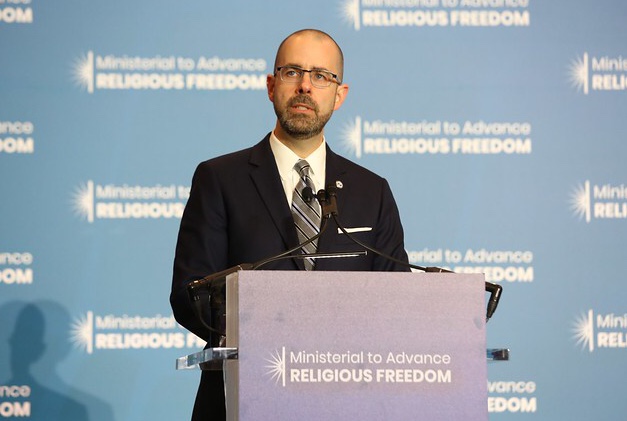
Writing in The Diplomat, former US for religious minorities during both the Obama and Trump administrations, Knox Thames has urged for international pressure and sanctions on Sri Lanka to force a change in the government's policy of religious persecution against Hindus, Christians, and Muslims.
The diplomat's statements follow two damning reports on religious freedom in Sri Lanka by the Cristian Solidarity Worldwide (CSW) and the U.S. Commission on International Religious Freedom which have highlighted the degradation of religious freedom on the island.
In his piece, he maintains that the US, European powers and Asia countries maintain a strong interest in seeing a course correction and must apply bilateral pressure on Sri Lanka to achieve this.
"U.N. mechanisms carry substantial weight and have an established track record, so they should be protected and enforced. Bilateral pressure for legal reforms, such as the PTA and the 2008 Circular, are needed. And should Sri Lankan officials participate in serious human rights abuses, the United States’ Global Magnitsky Act provides the ability to target individuals with sanctions".
Religious persecution
The CSW report details that Christians have been “targeted through legal means, via orders to close or register their places of worship". The report further adds that "Hindu kovils (temples) are coming under threat in the north-east as they are being replaced by Buddhist temples, and the grounds on which the kovils stand are being claimed as Buddhist archaeological sites by the Archaeological Department".
Further detailed in the report is how the Easter Sunday bombings has traumatised the Christian community and driven divisions between the Muslim and Christian community, which had previously enjoyed positive relationships.
The US report highlights the continued use of Sri Lanka's draconian Prevention of Terrorism Act to target Muslims and jail them for lengthy periods on trumped-up charges. The report further adds that there have been attempts to “reduce the visibility of Islam through the destruction of mosques and restrictive stances on religious clothing". Further measures to reduce visibility include restricting Islamic religious practices, such as a ban on burqas and the closure of Islamic schools.
Thames notes that a key factor driving religious discrimination is Sinhala Buddhist chauvinism which perceives Muslims as "a threat to both Buddhism and the Sinhalese". He also details how Buddhist extremists have used social media to spread islamophobia and provoke violent attacks against Muslims, which have received "little police response".
Thames maintains that "social media companies have a responsibility to moderate their content to prevent incitement to violence against minorities".
The Rajapaksa's authoritarian moves
![]()
Thames further lays blame at the Rajapaksa family directly stating that "they won the election on a political platform of division and will not quickly walk away from it".
He also raises concerns over "authoritarian moves" such as the withdrawal from the UN Human Rights Council Resolution and the passage of the 20th amendment which strengthened the President's powers whilst removing essential checks.
Commenting on the proposed new constitution and electoral system, Thames warns that these present means to further solidify this centralizing trend. He adds that "the Rajapaksa’s pro-China tilt leaves them open to the worst examples of human rights abuses and one-party rule".
Read the full piece at The Diplomat
